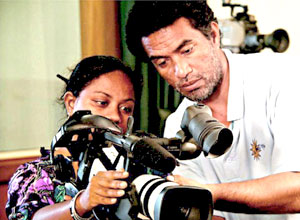Nauru is one of the smallest countries on the planet. And since the end of its phosphate mining boom in the 1990s, it is also one of the least prosperous. Where once stood a thriving economy built on the island's mere 21 square kilometres of land, there is now an excess of rundown buildings and closed businesses.
With a population of just 10,000 people, the Pacific island nation has struggled to maintain a functioning media industry. Communications infrastructure is weak, and a lack of skills and experience across this tiny country pose a huge challenge when it comes to delivering important information to local communities. To this day, there are still no qualified journalists in Nauru. But progress is being made.
'We had very little here three years ago. You couldn't hear the radio station unless you drove past it, and there was no local television as such – very, very minor local television,' Rod Henshaw, the Government of Nauru's Media Director, said.
AusAID has been supporting Nauru's media since 2008, breathing new life into the almost-defunct industry. Over the past four years, local state-run television and radio stations have been established, staff have been trained, and equipment such as cameras and microphones upgraded for better production quality. AusAID funding has also improved transmission facilities, resulting in stronger broadcast signals covering the entire country.
The two stations air locally-produced content, in addition to programs from the Australia Network, ABC Ratio Australia, and the BBC. A new monthly newspaper also hit the stands in 2010. Titled Mwinen Ko, which means 'let's talk about the issues', the paper is produced entirely by local staff and reports on government and community news.
'We're now starting to adopt a more professional approach to our work. That goes for everything, from radio to television, to editing, to producing to camera work – you name it… And I think one of the great things we have been able to introduce has been the newspaper,' Rod said.
Nauru's media unit now employs 30 people, and training continues to be provided to budding reporters and production staff. In a country with one of the world's highest unemployment rates [external website], creating a sustainable work environment and building the skills of local workers is an investment in Nauru's future.
The improved media environment means Nauru's entire population now has access to detailed information about government decisions and policies. Communities can also stay updated on locally-produced news. This is a big step in not only keeping Nauruans informed about the development of their country, but in supporting Nauruans to contribute to their own development processes.


